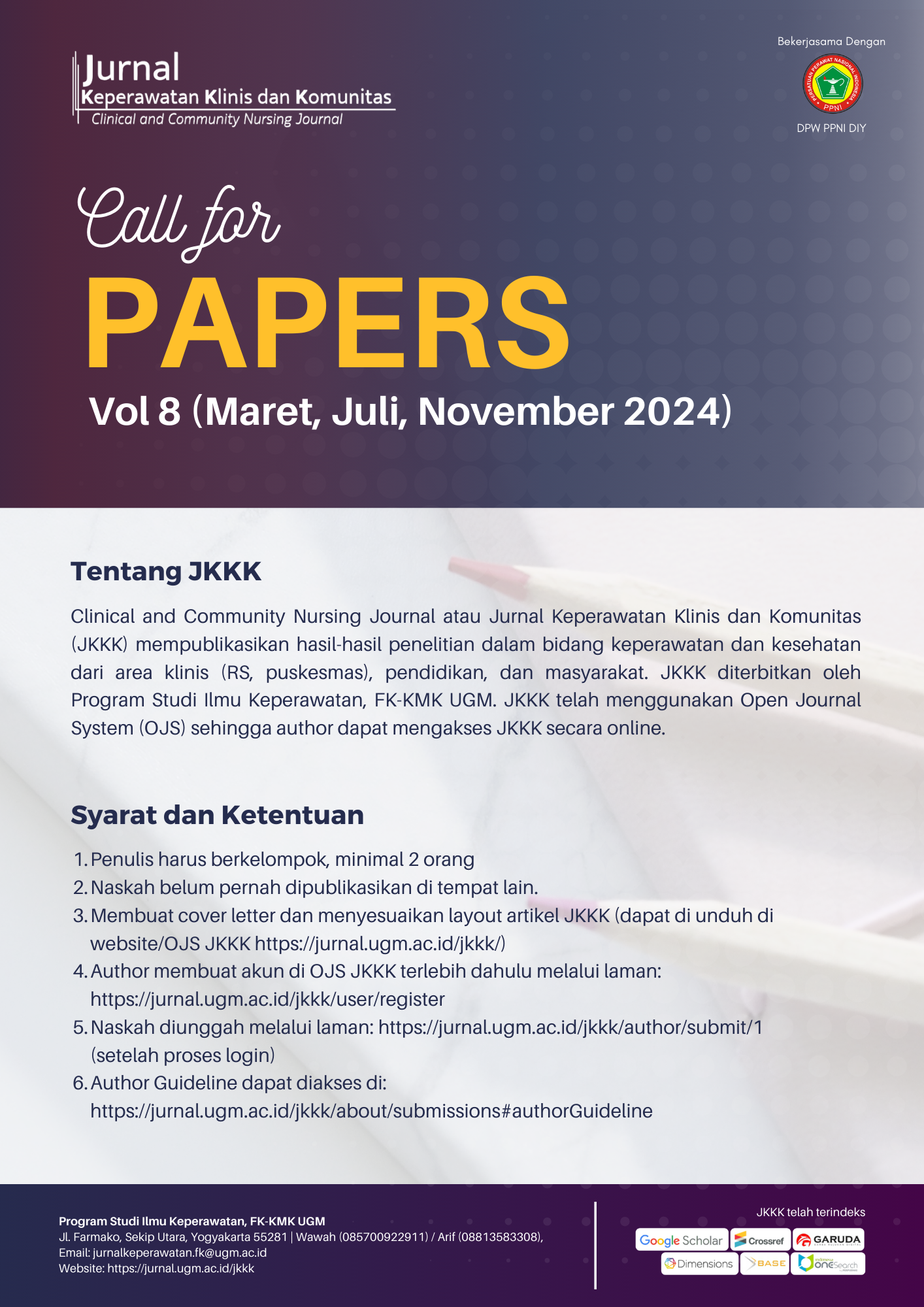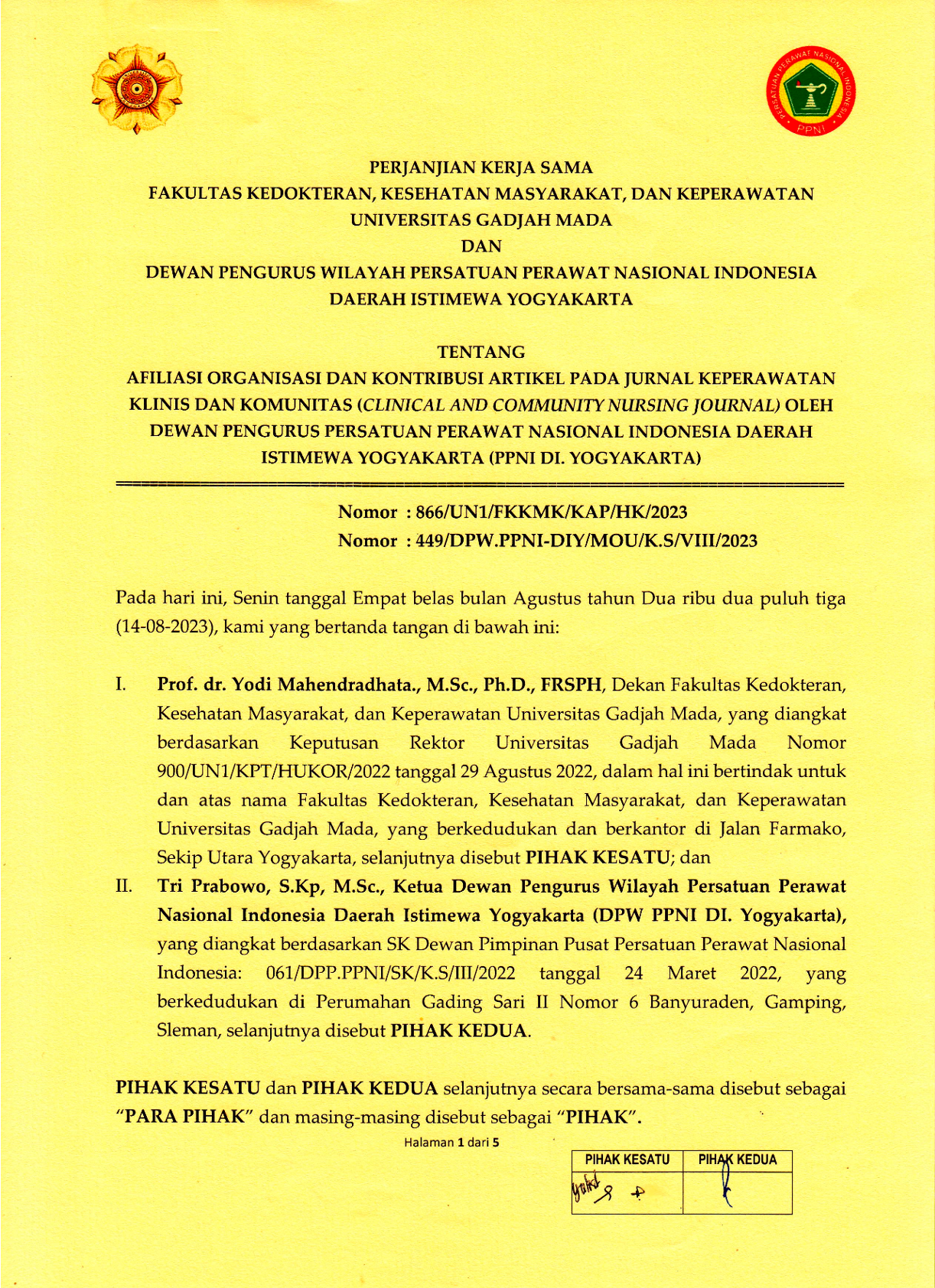Hubungan Tingkat Pengetahuan dengan Kepatuhan Terapi ARV pada ODHA di Yogyakarta
Erika Agustin Wulandari(1*), Dwi Kartika Rukmi(2)
(1) Program Studi Ilmu Keperawatan, Fakultas Kesehatan, Universitas Jenderal Achmad Yani Yogyakarta
(2) Departemen Keperawatan Medikal Bedah, Program Studi Ilmu Keperawatan, Fakultas Kesehatan, Universitas Jenderal Achmad Yani Yogyakarta
(*) Corresponding Author
Abstract
Background: Knowledge is something that can influence individual behaviour, and it is also one of the factors that can affect adherence. On the other hand, an individual who has knowledge about HIV/AIDS does not always has good adherence to ARV (antiretroviral) therapy.
Objective: Determine the correlation between the level of HIV/AIDS knowledge with the adherence to ARV therapy in people living with AIDS (PLWHA) at the Victory Plus Foundation, Yogyakarta.
Methods: This research was a correlative analytic study with a cross-sectional design approach. A total of 67 PLWHA who underwent ARV therapy at the Victory Plus Foundation Yogyakarta were chosen as respondents through purposive sampling technique, between May and July 2019. Data collection used the HIV/AIDS Knowledge Level Questionnaire and The Morisky Medication Adherence Scale (MMAS-8), which have been considered as valid and reliable. Somers' D Test used to analyze obtained data.
Results: The level of knowledge of PLWHA in this study was in the high category (92,5%), while adherence to ARV therapy was in the moderate category (40,3%). There is no significant correlation between the level of knowledge and adherence to ARV therapy (r= 0,113; p-value= 0,153).
Conclusion: The level of knowledge of HIV patients undergoing ARV therapy at the Victory Plus Foundation Yogyakarta is high and their adherence to ARV therapy is moderate, but there is no relationship between these two variables. Consequently, healthcare provider should focus on other scientific-proven factors, than HIV/AIDS knowledge, to increase ARV therapy adherence among patients for successful HIV treatment.
ABSTRAK
Latar Belakang: Pengetahuan merupakan salah satu faktor yang dapat memengaruhi perilaku individu dan kepatuhan. Namun, individu yang memiliki pengetahuan yang baik tentang HIV/AIDS tidak selalu memiliki kepatuhan terapi ARV (antiretroviral) yang baik.
Tujuan: Mengetahui hubungan tingkat pengetahuan HIV/AIDS dengan kepatuhan terapi ARV pada orang dengan HIV AIDS (ODHA) di Yayasan Victory Plus Yogyakarta.
Metode: Penelitian ini merupakan penelitian analitik korelatif dengan pendekatan desain cross sectional. Sebanyak 67 ODHA yang menjalani terapi ARV di Yayasan Victory Plus Yogyakarta dipilih sebagai responden dengan teknik purposive sampling, antara bulan Mei hingga Juli 2019. Pengumpulan data menggunakan kuesioner Tingkat Pengetahuan HIV/AIDS dan Morisky Medication Adherence Scale (MMAS-8), yang sudah valid dan reliabel. Uji Somers' D digunakan untuk menganalisis data yang diperoleh.
Hasil: Tingkat pengetahuan ODHA dalam penelitian ini termasuk dalam kategori tinggi (92,5%), sedangkan kepatuhan terapi ARV dalam kategori sedang (40,3%). Tidak ada hubungan yang signifikan antara tingkat pengetahuan dengan kepatuhan terapi ARV (r= 0,113; p-value= 0,153).
Kesimpulan: Tingkat pengetahuan pasien HIV yang menjalani terapi ARV di Yayasan Victory Plus Yogyakarta tinggi dan kepatuhan terapi ARV sedang, tetapi tidak ada hubungan antara kedua variabel tersebut. Dampaknya, penyedia layanan kesehatan harus fokus pada faktor-faktor ilmiah lain, selain pengetahuan HIV/AIDS, agar dapat meningkatkan kepatuhan terapi ARV di antara pasien untuk pengobatan HIV yang berhasil.
Keywords
Full Text:
PDFReferences
- World Health Organization. Global Action Plan on HIV Drug Resistance 2017–2021: 2018 Progress Report. 2018. Available from https://apps.who.int/iris/bitstream/handle/10665/273049/WHO-CDS-HIV-18.12-eng.pdf?sequence=1&isAllowed=y.
- Kementerian Kesehatan RI. Laporan Situasi Perkembangan HIV-AIDS & Pims di Indonesia Tahun 2017. 2018. Available from: https://siha.kemkes.go.id/portal/perkembangan-kasus-hiv-aids_pims#.
- Dinas Kesehatan Provinsi DIY. Profil Kesehatan Dinas Kesehatan Provinsi di Yogyakarta Tahun 2017. Yogyakarta: Dinas Kesehatan DIY; 2017.
- Pusdatin RI. Infodatin HIV/AIDS [Internet]. 2020. Available from: https://pusdatin.kemkes.go.id/
resources/download/pusdatin/infodatin/infodatin-2020-HIV.pdf. - Aminoff M, Boller F, Swaab D. Handbook of Clinical Neurology: The Neurology of HIV Infection. 3rd Ed. Aminof MJ, Boller F, Swaab DF, Editors. Vol. 152, ELSEVIER. Amsterdam: Elsevier Inc.; 2018.
- Rukmi DK, Darussalam M. Analisis Faktor yang Berhubungan dengan Keterbukaan Status HIV Seropositif Wanita Penderita HIV/AIDS terhadap Pasangan Seksual di LSM Victory Yogyakarta. Media Ilmu Kesehatan. 2018;7(2):114–22.
- Menteri Kesehatan Republik Indonesia. Peraturan Menteri Kesehatan Republik Indonesia Nomor 21 Tahun 2013 tentang Penanggulangan HIV dan AIDS. 2013. Available from: https://www.kebijakanaidsindonesia.net/id/dokumen-kebijakan?task=download.send&id=361&cati
d=17&m=0. - Latif F, Maria IL, Syafar M. Efek Samping Obat terhadap Kepatuhan Pengobatan Antiretroviral Orang dengan HIV/AIDS. National Public Health Journal. 2014;9(2):101.
- Notoadmodjo S. Promosi Kesehatan dan Ilmu Perilaku. Jakarta: Rineka Cipta; 2007.
- Potchoo Y, Tchamdja K, Balogou A, Pitche VP, Guissou IP, Kassang EK. Knowledge and Adherence to Antiretroviral Therapy among Adult People Living with HIV/AIDS Treated in The Healthcare Centers of The Association “Espoir Vie Togo” in Togo, West Africa. BMC Clinical Pharmacology. 2010; 10.
- Andrade Moraes D, Oliveira R, Prado A, Cabral J, Correa C, Albuquerque M. Knowledge of People Living with HIV/AIDS about Antiretroviral Therapy. Enfermeria Global. 2018;49:127–141.
- Morisky DE, DiMatteo MR. Improving The Meassurement of Self-Reported Medication Nonadherence: Response to Authors. Journal of Clinical Epidemiology [Internet]. 2011;64(3):255–63. Available from: https://www.ncbi.nlm.nih.gov/pmc/articles/PMC3624763/pdf/nihms412728.pdf.
- Rosyida L, Priyandani Y, Nita Y. Kepatuhan Pasien pada Penggunaan Obat Anti-diabetes dengan Metode Pill-Count dan MMAS-8 di Puskesmas Kedurus. Jurnal Farmasi Komunitas. 2015;2(2):36–41.
- Arikunto. Prosedur Penelitian: Suatu Pendekatan Praktik. Jakarta: Rineka Cipta; 2010.
- Widayati N, Murtaqib. Identifikasi Status Psikologi Sebagai Upaya Pengembangan Model Rehabilitasi Klien HIV/AIDS Berbasis Komunitas. NurseLine. 2016;1(1):90–9.
- EOCD. Working Age Population (indicator) [Internet]. 2021. Available from: https://data.oecd.org/pop/working-age-population.htm.
- Gobel B, Risco. Mikrobiologi Umum dalam Praktik. Makassar: Universitas Hasanuddin; 2008.
- Nyoko Y, Hara M, Abselian U. Karakteristik Penderita HIV/AIDS di Sumba Timur Tahun 2010-2016. Jurnal Kesehatan Prima. 2016;1(1):4–15.
- Kambu Y, Waluyo A, Kuntarti. Umur Orang dengan HIV AIDS (ODHA) Berhubungan dengan Tindakan Pencegahan Penularan HIV. Jurnal Keperawatan Indonesia. 2016;19(3):200–2017.
- Yusri RA, Sarumpaet S, Rasmaliah. Karakteristik Penderita AIDS dan Infeksi Oportunistis di Rumah Sakit Umum Pusat (RSUP) H. Adam Malik Medan Tahun 2012. Jurnal USU. 2012;5(2):1–8.
- Ibrahim K, Herliani Y, Rahayuwati L, Nurmalisa B, Fitri S. Hubungan antara Fatigue, Jumlah CD4, dan Kadar Hemoglobin pada Pasien yang Terinfeksi Human Immunodeficiency Virus (HIV). Jurnal Keperawatan Padjajaran. 2018;5(3):271–8.
- Meehan J. Suicide in Mental Health in-Patients and Within 3 Months of Discharge. The British Journal of Psychiatry. 2006;188(2):129–34.
- UN Joint Programme on HIV/AIDS (UNAIDS). AIDS Epidemic Update 2009 [Internet]. 2009. Available from: https://www.unaids.org/en/resources/publications/2009/20091124_jc1700_
epi_update_2009_en.pdf. - Budiono, Rantetampang A, Sandjaja B. The Factors Affecting of Adherence Drug Medicine ARV to Patient with HIV/AIDS at Paniai Regency. International Journal of Sciences: Basic Applied Research. 2017;32(1):280–98.
- Yuliandra Y, Nosa U, Raveinal, Almasdy D. Terapi Antiretroviral pada Pasien HIV/AIDS di RSUP. Dr. M. Djamil Padang: Kajian Sosio-demografi dan Evaluasi Obat. Jurnal Sains Farmasi Klinik. 2017;4(1):1–8.
- Notoadmodjo S. Pendidikan dan Perilaku Kesehatan. Jakarta: Rineka Cipta; 2003.
- Burhan R. Pemanfaatan Pelayanan Kesehatan oleh Perempuan Terinfeksi HIV/AIDS. Jurnal Kesehatan Masyarakat Nasional. 2013;8(1):33–8.
- Septiansyah E, Fitriangga A, Irsan A. Faktor-faktor yang Berhubungan dengan Kepatuhan Pasien HIV/AIDS dalam Menjalani Terapi Antiretroviral di Care Support Treatment RSJ Sungai Bangkong Pontianak. Jurnal Mahasiswa PSPD FK Univ. Tanjungpura. 2018;4(1).
- Debby C, Sianturi S, Susilo W. Factors Related to Compliance of ARV Medication in HIV Patients at RSCM Jakarta. Jurnal Keperawatan. 2019;10(1).
- Anggraini R, Wahyono D, Rahmawati F, Gunawan C. Pengaruh Edukasi oleh Apoteker terhadap Kepatuhan Obat Antiretroviral (Arv) pada Pasien Hiv/Aids. In: The 5th Urecol Proceeding. 2017.
- Galistiani G, Mulyaningsih L. Kepatuhan Pengobatan Antiretroviral pada Pasien HIV/AIDS di RSUD Prof. Dr. Margono Soekarjo Purwokerto. Jurnal Media Farmasi. 2013;10(2):1–10.
- Horne R, Weinman J, Barber N, Elliot R, Morgan M. Concordance, Adherence and Compliance in Medicine Taking. London: National Co-ordinating Centre for NHS Service Delivery and Organisation; 2005.
- Husna C. Analisis Dukungan Sosial dengan Kepatuhan Therapy Antiretroviral (ARV) pada Pasien HIV/AIDS di Poliklinik Khusus RSUD. Dr. Zainoel Abidin Banda Aceh. Jurnal Ilmu Keperawatan. 2013;1(1).
- Sequera, S., Alvares, I. Knowledge and Self-Reported Practice of People Living with Human Immunodeficiency Virus, with Regard to Antiretroviral Therapy (ART) in Mangalore, India. Muller Journal Medical Science and Clinical Research. 2015;6(1):45–8.
- Khairunnisa, Saraswati L, Adi M, Udiyono A. Gambaran Kepatuhan Pengobatan ARV (Antiretroviral) (Studi pada Wanita Pekerja Seks (WPS) Positif HIV/AIDS di Kabupaten Batang). Jurnal Kesehatan Masyarakat. 2017;5(4):387–95.
- Hansana V, Sanchaisuriya P, Durham J, Sychareun V, Chaleunvong K, Boonyaleepun S, et al. Adherence to Antiretroviral Therapy (ART) among People Living with HIV (PLHIV): A Cross-Sectional Survey to Measure in Lao PDR. BMC Public Health. 2013;13(617).
- Yuniar Y, Handayani R, Aryastami N. Faktor–Faktor Pendukung Kepatuhan Orang dengan HIV AIDS (ODHA) dalam Minum Obat Antiretroviral di Kota Bandung dan Cimahi. Buletin Penelitian Kesehatan. 2013;41(2).
- Anwar Y, Nugroho S, Wulandari S. Profile of Antiretroviral Side Effects on Patient of HIV in RSPI Prof. Dr. Sulianti Saroso Jakarta. Jurnal Ilmu Kefarmasian Indonesia. 2018;16(1):49–55.
Article Metrics
Refbacks
- There are currently no refbacks.
Copyright (c) 2021 Erika Agustin Wulandari, Dwi Kartika Rukmi

Jurnal Keperawatan Klinis dan Komunitas (Clinical and Community Nursing Journal)
collaborates with DPW PPNI DIY
![]()
Jurnal Keperawatan Klinis dan Komunitas (Clinical and Community Nursing Journal) is licensed under a Creative Commons Attribution-ShareAlike 4.0 International License.




